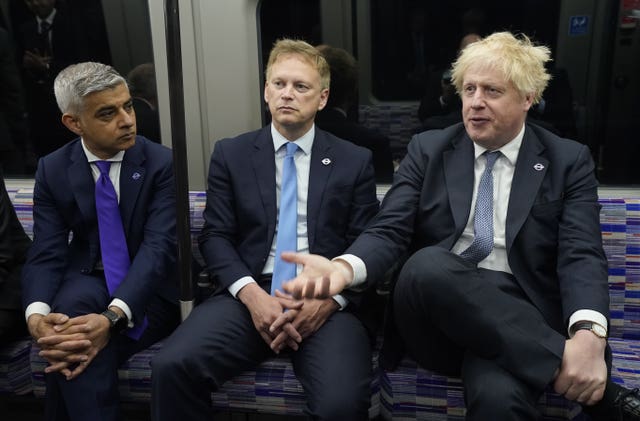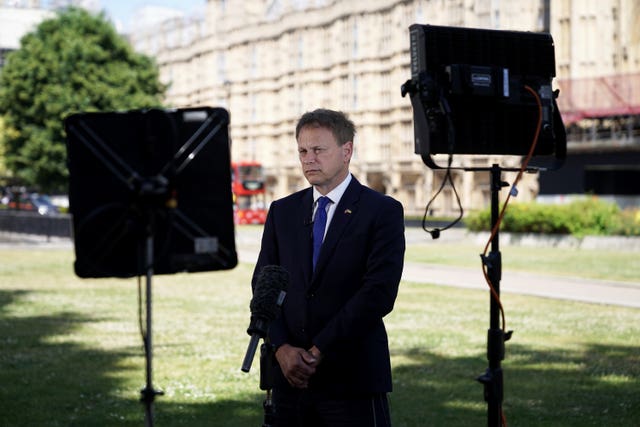Grant Shapps, spreadsheet schemer, takes Home Office reins
The former transport secretary was a major backer of Liz Truss’s rival Rishi Sunak in the Tory leadership contest.

Liz Truss has handed a prime seat at her Cabinet table to renowned strategist Grant Shapps after the departure of Suella Braverman as Home Secretary.
It may be a calculated move by the embattled Prime Minister to get a Tory big beast on her side – and one who is seen as a sharp-elbowed plotter who could otherwise help bring about her removal from No 10.
The former transport secretary is said to have recorded Tory colleagues’ doubts about Ms Truss in a running spreadsheet, wielded on a pricey foldable smartphone.
He also caused a headache for Ms Truss when he joined a revolt against her tax cuts, saying he was “profoundly” concerned about the plans and branding her decision to scrap the 45p top rate – which she has since reversed – as “politically tin-eared”.
He spent the Conservative Party conference earlier this month warning that Tory MPs would not “sit on their hands” in ousting Ms Truss without improvement.
Only two nights before his appointment, Mr Shapps told a theatre audience that Ms Truss had a “Mount Everest to climb” to remain in power and that her decision to surround herself largely with those who supported her campaign meant her base was too “narrow” to successfully lead the party.
The veteran of government is influential in the Conservative Party, having been instrumental in a rebellion against Theresa May and Boris Johnson’s path to power.
He was rewarded with a Cabinet role by Mr Johnson when he took office in 2019, which he held until Ms Truss dispatched him to the backbenches along with other backers of Mr Sunak.
The plane-obsessed Mr Shapps oversaw the Transport department during the Covid-19 pandemic and the ensuing airport chaos as travel resumed, and faced criticism for failing to engage with unions over industrial action.

With his local grammar school education and a rock star relative who played guitar for The Clash, the 53-year-old Welwyn Hatfield MP has a slightly different background from many of his contemporaries at the top of the Conservative Party.
He has had a chequered history with the Tories, and also posed problems for David Cameron with a series of scandals leading up to his resignation as a minister in November 2015.
After years of soaring through the Tory ranks, his rapid rise stalled during the 2015 general election campaign when he was accused of anonymously editing his own entry and those of other Conservative politicians on internet encyclopaedia Wikipedia.
Then-prime minister Mr Cameron stood by him and Mr Shapps called the allegations “bonkers”, and Wikipedia later found no definitive evidence linking Mr Shapps to the account used to amend the entries.
But the damage was done and Mr Shapps was removed as party chairman and made a minister at the Department for International Development – a move widely seen as a demotion.
He was forced to resign from the post after just six months when it emerged that he had been warned about bullying among young party activists almost a year before 21-year-old Elliott Johnson took his own life.

Just months before the Wikipedia scandal, Mr Shapps was accused of having breached the codes of conduct for ministers and MPs when it was revealed he held a second job after entering parliament.
He was exposed as having continued working as a marketer of get-rich-quick schemes under the pseudonym Michael Green.
Mr Shapps had been politically ambitious from a young age.
While his family leaned more towards music – brother Andre Shapps played keyboards with post-punk band Big Audio Dynamite and his cousin, Mick Jones, was a founder member of The Clash – Mr Shapps found his passion in politics, becoming national president of the Jewish youth organisation BBYO.
In his early 20s, he set up a marketing and printing business before contesting his first parliamentary seat in 1997. He eventually ousted Labour’s Melanie Johnson in 2005 to become MP for Welwyn Hatfield, being elected the Tory Party’s vice-chairman the same year.
In 2007, he became shadow housing minister and following the 2010 general election – in which he retained his seat with a majority of more than 17,000 – he served as minister of state for housing and local government, being appointed to the Privy Council that June.
In September 2012, he was appointed co-chairman of the Conservative Party, and also held the position of minister without portfolio at the Cabinet Office.
Born in Hertfordshire, Mr Shapps grew up in the area and was educated at Watford Grammar School and Manchester Polytechnic.
He is married with three children.





